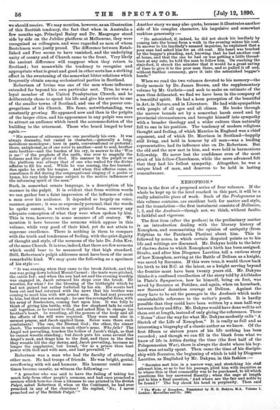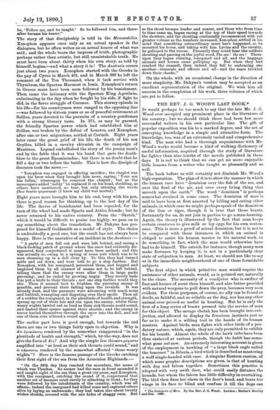XENOPHON.* THIS is the first of a proposed series of
four volumes. If the whole be kept up to the level reached in this part, it will be a
really admirable piece of work. Such of the Prolegomena as this volume contains, are excellent both for matter and style, and the translation—the first instalment consists of Hellenica, 1, 2, and the Anabasis—though not, we think, without faults, is faithful and vigorous.
The first item (after the preface) in the preliminary matter is an introduction dealing with the literary history of Xenophon, and summarising the opinion of antiquity (from Polybins to the Patriarch Photius) about him. This is followed by notes, in which certain disputed points as to his life and writings are discussed. Mr. Dakyns holds to the later of the two dates to which Xenophon's birth has been assigned. Strabo, and after him Diogenes Laertius, tell a curious story of how Xenophon, serving at the Battle of Delium as a knight, was saved by Socrates. If this were true, it would throw back his birth to 444 B.C. at the latest, as a knight serving beyond
the frontier must have been twenty years old. Mr. Dakyns thinks it a confused recollection of the story told by Alcibiades in Plato's Symposium, how he himself, being on foot, was saved by Socrates at Potidma, and again, when on horseback, saw Socrates' dauntless courage at Delium. Against the story have to be set the passages in the Anabasis which make unmistakable reference to the writer's youth. It is hardly
possible that they could have been written by a man half-way between forty and fifty. Mr. Dakyns would have done well to set them out at length, instead of only giving the references. These " Notes " clear the way for what Mr. Dakyns modestly calls "A Sketch of the Life of Xenophon." It is really as full and as interesting a biography of a classic author as we know. Of the first fifteen or sixteen years of his life nothing has been recorded ; and though we can fill in the blank from what we know of life in Attica during the time (the first half of the Peloponnesian War), there is always the doubt where his boy- hood was actually spent. Then came the time of his disciple- ship with Socrates, the beginning of which is told by Diogenes Laertius, as Englished by Mr. Dakyns, in this fashion :—
" Socrates met him in a narrow way, and stretching his staff athwart him, so as to bar his passage, plied him with inquiries as to where this or that commodity was to be purchased, to all which questions the boy answered fluently ; when the sage at length put to him a final question, And where are the fair and noble to be found ?' The boy shook his head in perplexity. Then said • The Works of Xenophon. Translated by H. G. Dakyns, M.A. Volume I. London: Macmillan and Co. 1890.
he, Follow me, and be taught.' So he followed him, and there- after became his hearer."
The story of that discipleship is told in the Memorabilia.
Xenophon appears once only as an actual speaker in the dialogues, but he often writes as an actual hearer of what was said ; and the whole bears the impress of truth, photographic
perhaps rather than artistic, but still unmistakable truth. He must have been about thirty when his own story, as told by himself, begins,—and what a story it is ! The Anabasis covers
just about two years. Xenophon started with the Greeks in the pay of Cyrus in March 401, and in March 399 he left the remnant of the Ten Thousand, when it took service with Thymbron, the Spartan Harmost in Ionia. Xenophon's return to Greece must have been soon followed by his banishment. Then came the intimacy with the Spartan Xing A.gesilaiis, culminating in the day when he fought by his side, if fight he did, in the fierce struggle of Coronea. This stormy episode in his life—for his countrymen were ranged in the opposing line —was followed by sixteen years or so of peaceful retirement at Scillus, years devoted to the pursuits of a country gentleman with a strong literary taste. In 371, as may be guessed, the friendly Spartan power which had established him at Scillus, was broken by the defeat of Leuctra, and Xenophon, after one or two migrations, settled at Corinth. Eight years later came the great grief of his life, the death of his son Grylliu3, killed in a cavalry skirmish in the campaign of M.antinea. Legend embellished the story of the young man's end by the fable that it was his hand that gave the death- blow to the great Epaminondas ; but there is no doubt that he fell a day or two before the battle. This is how the disciple of Socrates took the news :—
"Xenophon was engaged in offering sacrifice ; the chaplet was upon his brow when they brought him news, saying, • Your son has fallen,' whereupon he removed the chaplet ; but as the messengers added 'nobly' he replaced it on his head, shedding, as others have mentioned, no tear, but only uttering the words Oka, elniTbY oyeyesemeds (I knew my child was mortal)."
Eight years more brought him to his end, busy with his pen, there is good reason for thinking, up to the last day of his life. The decree of banishment had been repealed, for the turn of the wheel had made Sparta and Attica friends; but he never returned to his native country. From the "Sketch," which it would be difficult to praise too highly, we pass on to say something about the translation. Mr. Dakyns has pro- posed for himself Goldsmith as a model of style. The choice is undoubtedly a good one, but the result has not always been happy. Here is the narrative of an incident in the Anabasis :— "A party of men fell out and were left behind, and seeing a black-looking patch of ground where the snow had evidently dis- appeared, they conjectured it must have been melted ; and this was actually so, owing to a spring of some sort which was to be seen steaming up in a dell close by. To this they had turned aside and sat down, and were loth to go a step further. But Xenophon, with his rearguard, perceived them, and begged and implored them by all manner of means not to be left behind, telling them that the enemy were after them in large packs pursuing; and he ended by growing angry. They merely bade him put a knife to their throats ; not one step farther would they stir. Then it seemed best to frighten the pursuing enemy if possible, and prevent their falling upon the invalids. It was already dusk, and the pursuers were advancing with much noise and hubbub, wrangling and disputing over their spoils. Then all of a sudden the rearguard, in the plenitude of health and strength, sprang up out of their lair and ran upon the enemy, whilst those weary wights bawled out as loud as their sick throats could sound, and dashed their spears against their shields; and the enemy in terror hurled themselves through the snow into the dell, and not one of them ever uttered a sound again."
The earlier part here is good enough, but towards the end there are one or two things fairly open to objection. Why is arf bytalsorre; rendered by the somewhat exaggerated "in the plenitude of health and strength," which, by-the-way, does not give the force of ATE? And why the simple timer lUparro 'Alva-row amplified into ‘. as loud as their sick throats could sound," and zeifeworrec rendered by the somewhat affected "those weary wights"? Here is the famous passage of the Greeks catching their first sight of the sea from the Armenian Highlands :— " On the fifth day they reached the mountain, the name of which was Theches. No sooner had the men in front ascended it and caught sight of the sea than a great cry arose, and Xenophon, with the rearguard, catching the sound of it, conjectured that another set of enemies must surely be attacking in front ; for they were followed by the inhabitants of the country, which was all aflame ; indeed the rearguard had killed some and captured others alive by laying an ambuscade ; they had taken also about twenty wicker shields, covered with the raw hides of shaggy oxen. But as the shout became louder and nearer, and those who from time to time came up, began racing at the top of their speed towards the shouters, and the shouting continually recommenced with yet greater volume as the numbers increased, Xenophon settled in his mind that something extraordinary must have happened, so he mounted his horse, and taking with him Lycius and the cavalry, he galloped to the rescue. Presently they could hear the soldiers shouting and passing on the joyful word, The sea! the sea! There- upon they began running, rearguard and all, and the baggage animals and horses came galloping up. But when they had reached the summit, then indeed they fell to embracing one another—Generals and officers and all—and the tears trickled down their cheeks."
On the whole, with an occasional change in the direction of more simplicity, Mr. Dakyns's version may be accepted as an excellent representation of the original. We wish him all success in the completion of his work, three volumes of which are yet to follow.



































 Previous page
Previous page